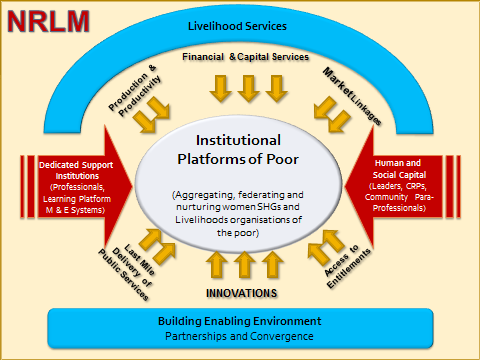Deendayal Antyodaya Yojana-National Rural Livelihoods Mission
About
- Aajeevika-National Rural Livelihoods Mission (NRLM) was launched by the Ministry of Rural Development (MoRD) in 2011.
- Aided in part through investment support by the World Bank, the scheme aimed at helping the rural poor by enabling them to increase household income through sustainable livelihood enhancements and improved access to financial services.
- NRLM has the mandate of reaching out to 100 million rural poor in 6 lakh villages across the country.
- In 2015, the program was renamed Deendayal Antyodaya Yojana-National Rural Livelihoods Mission (DAY-NRLM).
- NRLM rests on three major pillars – universal social mobilization, financial inclusion and livelihood enhancement.
Implementation
- It works towards bringing at least one member (preferably a woman) from all poor families into the Self Help Group (SHG) network.
- The SHGs and their federations offer their members microfinance services such as – savings, credit, bank linkages, insurance, remittances, equity etc. They also offer collectivization and group activities. The SHGs offer social security and social action in various fronts including health, nutrition, food, gender, convergence etc., directly or through their federations.
- NRLM facilitates the SHGs to open and operate bank accounts and bank linkages. It also facilitates access to insurance to members. It encourages individual members too to open bank accounts.
- As the Institutions of the Poor (IoP) mature, they are facilitated to take up livelihoods/income-generating activities.
- SHGs, their federations at the village, cluster levels and beyond, and other collectives of the poor constitute IoP.
- DAY-NRLM adopts a demand driven approach, enabling the States to formulate their own State specific poverty reduction action plans.
Beneficiaries
- NRLM’s priority is to reach out to the poorest, most vulnerable and marginalized. It begins with targeting women and they are considered as representatives of their households.
- In case of extremely vulnerable persons like Persons with Disabilities (PwDs), elders etc., NRLM mobilizes both men and women.
- The NRLM Target Households (NTH) are identified through the Participatory Identification of Poor (PIP). The PIP is a community-driven process where the Community Based Organisations (CBOs) themselves identify the poor in the village using participatory tools. The list of poor identified by the CBO is vetted by the Gram Sabha.

Why in the news?
- This information was given by the Union Minister of State for Rural Development in a written reply in Rajya Sabha.
https://pib.gov.in/PressReleasePage.aspx?PRID=1985781
Subscribe
Login
0 Comments
